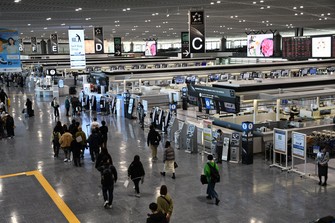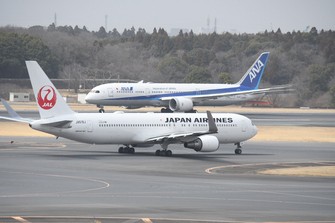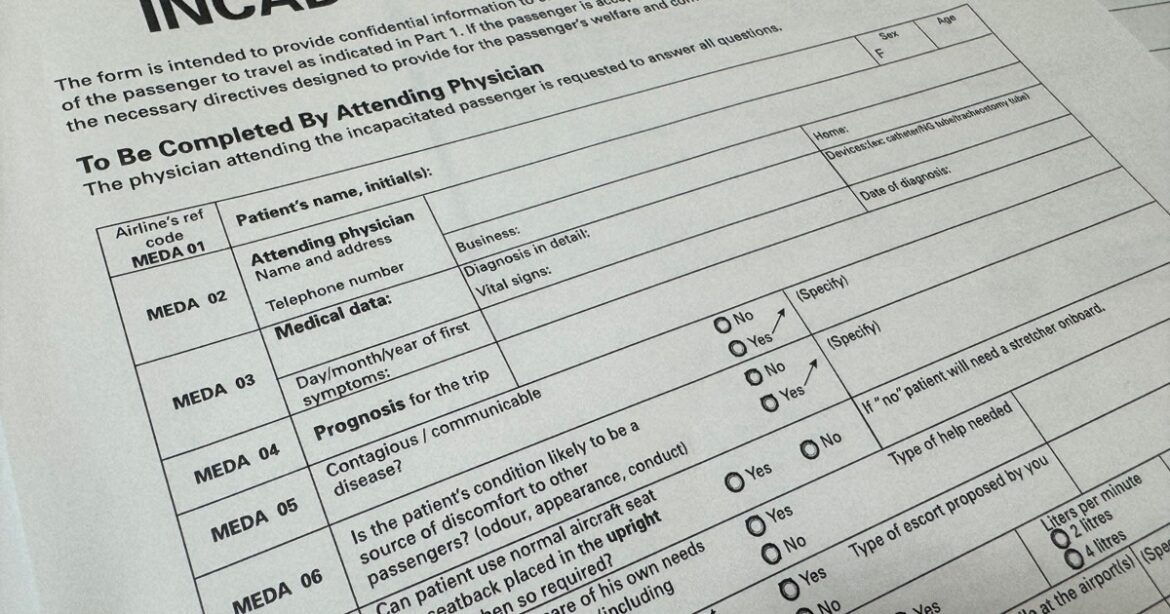
A “medical information sheet” used by SriLankan Airlines is seen in this photo taken on March 11, 2025. The sixth question asks, “Is the patient’s condition likely to be a source of discomfort for other passengers? (odour, appearance, conduct)” (Mainichi/Shinji Kurokawa)
TOKYO — One international airline operating in Japan sends apparently unnecessary and privacy-invasive medical forms to disabled passengers regardless of whether they require special considerations, the Mainichi Shimbun has found, with similar cases reported at other airlines.
The company’s form also prejudicially asks if the “patient” may discomfort other passengers through odor, appearance or conduct. Disability groups are asking the national government to remedy the situation, while the Ministry of Land, Infrastructure, Transport and Tourism has also embarked on a study of the issue.
Airline sends question form
Yoshihiko Kawauchi, a 71-year-old expert on accessibility and a researcher at Toyo University, this February booked a direct flight on SriLankan Airlines between Narita Airport and Sri Lanka to participate in a workshop and other activities in April, as part of a project undertaken by the Japan International Cooperation Agency (JICA).
In March, after informing SriLankan Airlines via JICA of Kawauchi’s wheelchair use, a medical form was emailed to him that needed to be filled out by a doctor. Wheelchair users are reportedly required to submit these.
Kawauchi has used a wheelchair since he was 19 after a major cervical spinal cord injury, but he is no longer a “patient” in need of treatment at hospitals.
“Why is it uniformly necessary for a person to provide medical information, which is highly private, just because they are in a wheelchair?” he said, questioning the practice.
Bewilderment beyond anger

Passengers are seen walking in an international departure lobby of Narita Airport in the city of Narita, Chiba Prefecture, on Jan. 12, 2024. (Mainichi/Tadakazu Nakamura)
While filled with anger, Kawauchi looked over the questions on the form in English. As he read through its 16 points, one took him by surprise: “Is the patient’s condition likely to be a source of discomfort for other passengers? (odour, appearance, conduct)”
If he checked “yes,” he’d be expected to provide further details. “It’s an absurdly discriminatory view toward those with disabilities. I was beyond angry, and bewildered,” said Kawauchi. JICA also apparently asked the airline company to revise their handling of those with disabilities.
The Mainichi Shimbun asked SriLankan Airlines for the reasons they require wheelchair users to provide medical documentation, along with the contents of such requests. The airline declined to directly answer the questions, but made a comment including a portion to the effect, “In all of our operations, the comfort, health and safety of our passengers are our top priorities. We strive to improve and develop our procedures based on valuable feedback from our customers and the regulatory authorities in the countries where we operate.”
Other airlines’ demands of disabled people
Satoshi Sato, secretary general of the Japan National Assembly of Disabled Peoples’ International based in Tokyo’s Chiyoda Ward, said that SriLankan Airlines is not the only company to issue such demands.

Narita Airport is seen in the city of Narita, Chiba Prefecture, on March 17, 2024. (Mainichi/Tadakazu Nakamura)
According to sources including the Japanese transport ministry, in November 2024 and February this year on flights operated by the United Arab Emirates-based carrier Emirates, wheelchair users were asked to submit medical forms when boarding flights between Japan and South Africa, even though they did not require medical care. Similar cases involving other airlines in Asia have additionally been reported.
“Discriminatory handling, such as requiring people with disabilities who do not need medical care to submit medical certificates, have long been perpetrated by and partly continue to occur with Asian and Middle Eastern airlines,” said Sato.
In contrast, Japanese carriers Japan Airlines (JAL) and All Nippon Airways (ANA) said they require such documentation only when medical equipment is used in the cabin, and do not uniformly require wheelchair users to submit a medical certificate.
The request for medical info by JAL, which is a member of the “oneworld” airline alliance that includes SriLankan Airlines, contains a question about how other passengers are affected, but does not mention things such as appearance or odor. JAL stated that the South Asian carrier’s medical request form is not commonly used between oneworld member airlines.
Ministry checking if airline violating antidiscrimination guidelines
In November 2023, the transportation ministry created response guidelines for carriers based on the Act for Eliminating Discrimination against Persons with Disabilities. Under the guidelines, “requesting a medical certificate from a user who has no specific obstacles to air travel” is given as a concrete example of improper, discriminatory treatment.
The ministry is distributing the guidelines to all airlines that touch down on Japanese territory. An official stated, “Even foreign airlines fall under the category of ‘airline operators’ that are legally required to follow the guidelines. We are currently investigating whether the SriLankan Airlines case violates the guidelines.”
Measures needed at airline alliance level: expert

A “medical information sheet” used by SriLankan Airlines is seen in this photo taken on March 11, 2025. The sixth question asks, “Is the patient’s condition likely to be a source of discomfort for other passengers? (odour, appearance, conduct)” (Mainichi/Shinji Kurokawa)
The U.N. Convention on the Rights of Persons with Disabilities adopted in 2006 aims to protect the human rights and freedom of people with disabilities and to promote respect of their dignity. The convention bans all forms of discrimination against those with disabilities and calls for its over 190 member states to take action. Japan ratified it in 2014, while Sri Lanka did so in 2016.
Kawauchi said, “In light of the Convention on the Rights of Persons with Disabilities, which is based on ‘equality with others,’ not to mention the disability discrimination law, it is clearly wrong to require passengers to submit medical certificates simply because they have disabilities. I hope that the entire alliance takes measures thoroughly, rather than leaving it up to each individual airline.”
(Japanese original by Shinji Kurokawa, Tokyo City News Department)


AloJapan.com